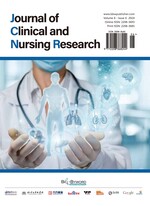Abstract
Objective: To explore the effect of nursing interventions based on self-efficacy theory guidance on psychological stress indicators in patients with hepatitis B cirrhosis. Methods: 70 patients with hepatitis B cirrhosis from October 2023 to May 2024 were selected and grouped by random number table. The observation group received nursing intervention based on self-efficacy theory, while the control group received routine nursing. The differences in psychological stress indicators, self-efficacy indicators, and nursing satisfaction were compared between the two groups. Results: Hamilton Anxiety Rating Scale (HAMA) and Hamilton Depression Rating Scale (HAMD) scores of the observation group were significantly lower than those of the control group (P < 0.05); Chronic Disease Self-Efficacy Scale (CDSES) scores of the observation group were significantly higher than those of the control group (P < 0.05); and nursing satisfaction scores of the observation group were significantly higher than those of the control group (P < 0.05). Conclusion: Hepatitis B cirrhosis patients receiving nursing care based on self-efficacy theory can stimulate patients’ self-efficacy, calm their emotions, and their overall satisfaction is high.
References
Xiao X, Cen M, Tang Z, 2022, Effect of Comprehensive Nursing Intervention on Compliance Behaviour and Self-Efficacy of Patients with Cirrhosis in Decompensated Stage. Contemporary Medicine, 28(11): 188–190.
Xu M, 2023, Observation on the Application Effect of Empowerment Education Concept Guidance in Patients with Hepatitis B Cirrhosis. Practical Chinese and Western Medicine Clinic, 23(12): 125–128.
Li X, 2023, Application of Personalised Education in Patients with Hepatitis B Cirrhosis in the Decompensated Stage Under the Integration Theory of Behavioural Change. Primary Medical Forum, 27(33): 13–15.
Huang S, 2023, Effectiveness of the Teach-Back Method Combined with Self-Efficacy Nursing Care in Patients with Cirrhosis Combined with Diabetes Mellitus. Chinese and Foreign Medicine Research, 21(31): 106–110.
Gong X, Yin M, He Z, 2023, Analysis of the Application Effect of the Concept of Continuous Nursing Management Intervention on Patients with Hepatitis B Cirrhosis with Loss of Compensation. China Community Physician, 39(7): 122–124.
Rong J, Yang X, Zhang Y, 2022, Effects of “Hospital-Community-Family” Triadic Social Support on Psychological Resilience and Self-Management Ability of Patients with Hepatitis B Cirrhosis in the Compensated Stage. Practical Preventive Medicine, 29(1): 98–101.
Zhao X, Wang L, Suo L, 2020, Nursing Practice Research on Self-Management Mode in Patients with Hepatitis B Cirrhosis. Chinese General Medicine, 2020(1): 146–149.
Chen X, Zeng Q, Zhang Y, et al., 2021, Effects of REBT on Mental Health Level, Self-Efficacy and Self-Management in Patients with Hepatitis B Cirrhosis. International Journal of Psychiatry, 48(3): 561–564.
Jia Z, Zhou Z, 2020, Effect of Nursing Intervention Based on Self-Efficacy Theory in COPD Patients. Chinese Journal of Modern Nursing, 26(21): 2925–2928.
Zhu F, Qian X, Zhu L, 2023, Application of Nursing Based on Self-Efficacy Theory in Early Functional Exercise of Affected Limbs of Patients After Permanent Pacemaker Implantation. Chinese Journal of Practical Nursing, 39(15): 1144–1150.
